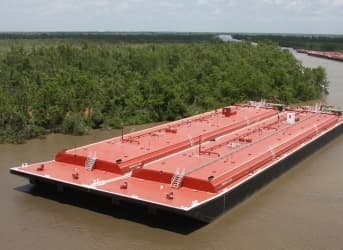It is no secret that oil transportation infrastructure in North America is strained and Albertan oil is having a difficult time getting to market. Pipeline construction is chronically delayed and rail companies are running out of oil tank cars, but oil companies are considering a new route. Calumet Speciality Product Partners, an Indiana-based company, is planning to spend $20 million to upgrade a dock in Lake Superior to load bitumen onto barges and ship it through the lake system to other refineries. While approval for the project is far from certain, it does signal a trend in the industry.
"Given a lack of sufficient pipeline and rail capacity to transport crude oil from northern production fields to key refining centers, this project has received significant indications of interest from our customers," said a company statement. Calumet hopes to see its operations up and running by the 2015 shipping season.
If approved, this transportation method could bring with it considerable risks. Unlike normal oil, bitumen is heavier than water and sinks, making cleanup far more difficult. Michigan’s Kalamazoo River incident serves as an example of the risks posed when bitumen and water meet. When an Enbridge pipeline ruptured in the summer of 2010, it leaked 3.3 million litres of oil into the river and it is still considered the largest on-land oil spill in American history. The incident cost Enbridge more than $1 billion to cleanup and, more than three years after the accident, the Environmental Protection Agency ordered Enbridge to deal with the approximately 684,000 litres of bitumen that avoided capture and had since settled in the riverbed.
No shipping method is totally safe, and accidents and spills are a virtual certainty over the long-term. These “submerged” oil spills are a serious problem in any body of water, but are especially concerning if they occur in the Great Lakes, the source of drinking water for over forty million North Americans. The Alliance for the Great Lakes released a report on the subject, voicing concern about the safety of transporting bitumen across the “word’s single largest surface freshwater system.”
Transportation is a hot topic in the oil industry at the moment and companies are ever searching for new means to get their product to market. As environmentalists continue to use every method at their disposal to block pipelines like Keystone XL, Northern Gateway, and Energy East, these companies are being forced to consider options potentially far more environmentally devastating than a pipeline. While these pipelines serve as large, symbolic battles for the environmental movement, opposing them may do more harm than good in the long run.
By. Rory Johnston of Oilprice.com



















Michigan State ( PhD 1977 ). Both of my parents
grew up in MI upper peninsula and I vacationed
There as a child. My dad worked on the ore boats
while going to college. I KNOW LAKE SUPERIOR!
Water quality is going down every year.
WE DON'T NEED ANY CRAP FROM CANADA
TRANSITING SUPERIOR.
Jeffrey M Doyle, PhD